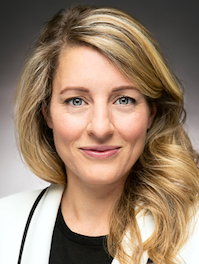Cameroon: Religious leaders welcome Canadian peace initiative

Mélanie Joly
Religious leaders in Anglophone Cameroon are calling for an immediate ceasefire to ensure Canada-led peace talks are successful. The Archbishop of Bamenda has been joined by leaders of the Baptist, Anglican and Presbyterian churches, in addition to mosques in Buea and Bamenda, issuing a joint call welcoming Canada's initiative.
On January 20, Canada's Minister of Foreign Affairs Mélanie Joly announced talks including the Yaoundé government and several non-state armed groups and separatist representatives. Ottawa's bid to resolve the war in Cameroon follows attempts by Switzerland and the Vatican to bring about peace talks.
Launching the initiative, Canada said the agreement to enter a formal process was a "critical first step toward peace and a safer, more inclusive and prosperous future for civilians affected by the conflict."
The faith leaders describe the Canadian process as a major step toward the search for sustainable and lasting peace. They appeal "to all carriers of firearms to stop violence with immediate effect as this will promote confidence building and credibility as well as a conducive and assuring environment for the announced peace talks." They write as "frontline advocates of peace" who have witnessed the ravages of war during the six-year-long conflict in the North-West and South West regions of Cameroon.
However, there is confusion in Yaoundé as Cameroon's Minister of Communication René Emmanuel Sadi issued a statement saying Cameroon "has not entrusted any foreign country or external entity with any role of mediator or facilitator to settle the crisis in the North-West and South-West Regions."
The statement was unexpected because it follows four months of discussions between the Governments of Canada and Yaoundé, indicating the absence of unity in President Paul Biya's administration. This comes at a time of growing uncertainty about the successor to the increasingly frail 89-year-old Biya.
Anglophone Cameroonians have reacted to the government's potential U-turn with disbelief and frustration. Yaah Maggie Kilo, coordinator of the women's groups of Global Takumbeng, said the Biya government had been inconsistent in its messaging to the international community. "First, La Republique Cameroun insists there's no problem. Second, there's a small internal problem. Then it agrees there's a problem but no one to negotiate with them. Now there's no negotiation. What should the peace-loving people of the former British Trust Territory do?" she asked, using the pre-independence name for the Anglophone regions.
Commentators worry that the Cameroon government's commitment to using military means to combat the armed separatist fighters will only escalate the violence, with civilians caught in the middle.
The faith leaders, including Archbishop Andrew Nkea of Bamenda, call on the international community to sustain its interest in finding a resolution to the crisis for the common good of the Cameroonian people.
Background to the Anglophone Conflict
In 2016, the Francophone-dominated central government tried to impose French judges on the English common law system in the Anglophone regions. Yaoundé also attempted to force French-speaking teachers on schools that traditionally teach in English using a British curriculum. When lawyers and teachers protested, their peaceful demonstrations were met with what international human rights monitors describe as disproportionate force by the Cameroonian security forces. As the government cracked down on civilians, armed separatist fighters emerged, demanding a country based on the borders of the Anglophone-dominated territory.
Violence by all sides has escalated throughout the conflict. As a result, the economy and livelihoods have deteriorated, individuals have been arbitrarily detained, kidnapped and ransomed, mutilated and tortured, traumatized and killed by separatist fighters and security services, with villages burned and schools targeted with impunity. Rights monitors have documented numerous atrocities committed by Cameroon's Defence and Security Forces and separatist fighters.
The UN estimates that the violence has claimed more than 6,000 lives and has kept 600,000 children out of school. Due to attacks on villages, at least 800,000 people have fled their homes, surviving in challenging conditions as internally displaced persons and refugees.


















